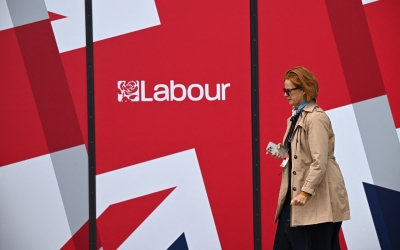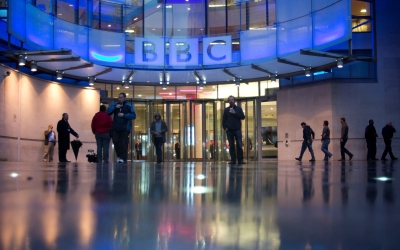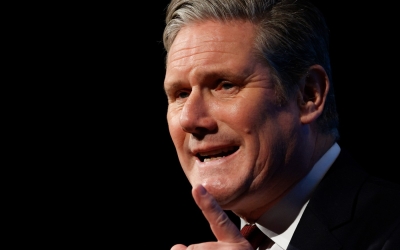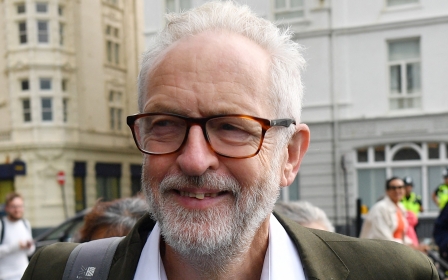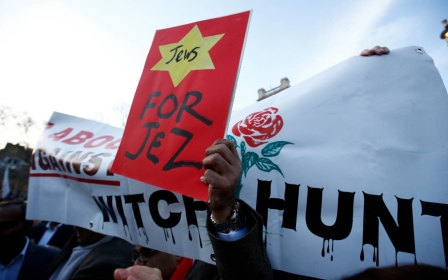Labour racism report author rejected BBC request to remove criticism of Panorama
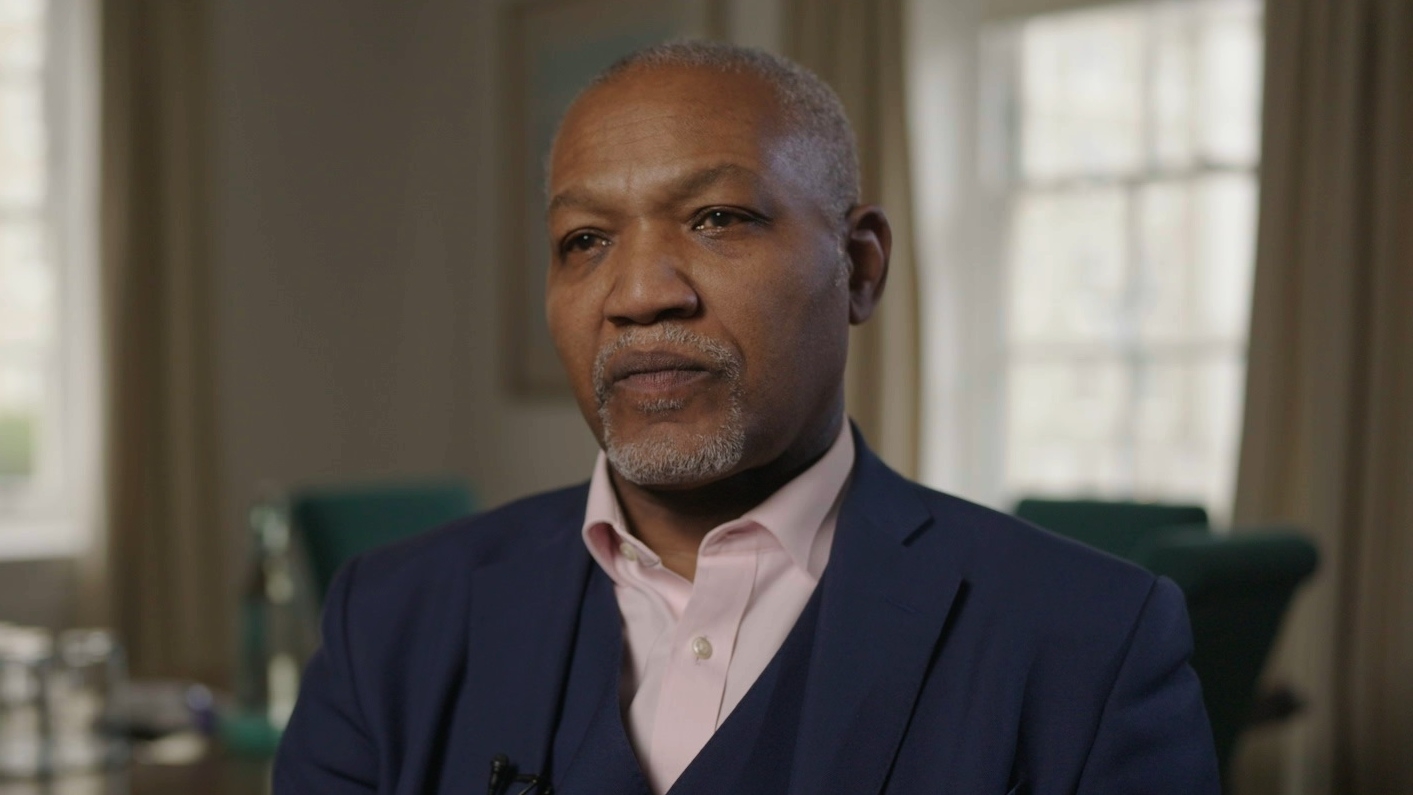
The BBC asked Martin Forde, the barrister charged with investigating factionalism and racism within the Labour Party, to remove criticism of the corporation’s coverage of allegations of antisemitism under Jeremy Corbyn’s leadership from his findings.
Speaking about his report for the first time since its release last July, Forde said he rejected the request to amend paragraphs in which he described the use of internal Labour Party emails by Panorama, the BBC’s flagship investigative programme, and other media organisations as “entirely misleading”.
In interviews with Al Jazeera’s Investigative Unit, which shared transcripts with Middle East Eye, Forde said: “I was invited to amend the report, I guess make it more in line with their [Panorama’s] conclusions, and that wasn’t something I was prepared to do.”
'I was invited to amend the report, I guess make it more in line with their [Panorama’s] conclusions, and that wasn’t something I was prepared to do'
- Martin Forde QC
The July 2019 episode of Panorama entitled "Is Labour Anti-Semitic?" was fiercely critical of Corbyn. It claimed his office had intervened in the party’s disciplinary procedures to the detriment of the fight against antisemitism.
Forde referred to the episode as “infamous”.
New MEE newsletter: Jerusalem Dispatch
Sign up to get the latest insights and analysis on Israel-Palestine, alongside Turkey Unpacked and other MEE newsletters
In a letter to Forde, dated 8 September 2022, Karen Wightman, the editor of Panorama, said the programme had not been given a fair opportunity to comment prior to publication of the report.
She said Panorama strongly disputed that it had misled the public and set out reasons why she believed the allegations presented by the programme were “all supported by evidence”.
Wightman wrote: “I would be grateful if you would consider amending your report in respect of your references to Panorama so that it more fairly reflects what the programme actually said, specifically excluding… any suggestion that Panorama was amongst those media outlets that you say ‘entirely misled’ the public over antisemitism complaints from mid-March to April 2018.”
Later in September last year, an episode of Al Jazeera’s Labour Files series, which this journalist directed, revealed that Panorama had removed vital context from a 2018 email sent by Seumas Milne, Corbyn’s director of communications, to the disciplinary unit.
Panorama quoted Milne saying the Labour Party was “muddling up political disputes with racism”.
It omitted the first half of the sentence, which revealed Milne was talking about a specific disciplinary case.
Milne wrote: “This member is a Jewish activist, the son of a Holocaust survivor. If we’re more than very occasionally using disciplinary action against Jewish members for anti-Semitism, something’s going wrong, and we’re muddling up political disputes with racism. Quite apart from this specific case, I think going forward we need to review where and how we’re drawing the line if we’re going to have clear and defensible processes.”
Forde said he had felt “vindicated” by the Al Jazeera documentary because it had “demonstrated graphically that [Milne’s email] had been filleted and, and I think the filleting meant the context was lost and a more sinister interpretation could be placed upon that email than was ever intended”.
“I just felt that a fair reading of the whole email gave it a more balanced and nuanced context,” he said.
After receiving the letter from the BBC, Forde said he had looked back at the material he had relied on, and discussed it with other members of the inquiry panel.
He concluded that he had had access to wider and different material to that used by Panorama.
“I felt I had a fuller picture [than Panorama] because I interviewed not only some of the participants in the programme; I also interviewed those who hadn’t participated in the programme from the alternative faction … I couldn't go so far as to say that this was deliberate. It just seemed to me to be objectively entirely misleading to have that partial quote.”
Forde stressed that his view was “highly qualified” but “an opinion”, and said his criticism of Panorama related to “a limited number of emails in a limited period”.
Wightman told MEE: “The BBC stands by its reporting that members of Mr Corbyn’s office did interfere in antisemitic disciplinary cases.”
John Ware, Panorama’s reporter, told MEE the BBC’s letter had “courteously invited” Forde to amend his report because he had “muddled up” the Milne email case with other cases which were later reported unfairly elsewhere in the media.
Forde said he had also received an email from Ware in October last year, requesting responses to a series of questions by 4pm the following day.
It was “quite aggressive in tone,” Forde said.
Ware said: “I reject entirely Mr Forde’s characterisation of my emails to him last autumn as aggressive… My emails were robust but always polite.”
The correspondence took place shortly before Ware wrote a column for the Jewish Chronicle newspaper defending Panorama’s reporting.
Forde reiterated that he believed he and Ware had had access to different material and had reached different conclusions because of that.
“He [Ware] went where his evidence took him, and that's what journalists do,” he said.
Ware said Forde’s criticism appeared to be “heavily caveated”.
Forde said he was also “concerned” about a sequence in the Panorama film in which a Labour Party investigator, Ben Westerman, who is Jewish, told the programme that a party member had asked him if he was “from Israel”.
In a recording of the member’s comments, later shown in the Al Jazeera documentary, she can be heard asking: “What [Labour Party] branch are you in?”
Panorama omitted to mention that she was an elderly Jewish woman.
The sequence was presented in the Panorama film as evidence of antisemitism. “To my ear [the recording] revealed nothing of the sort,” said Forde. He stressed he did not investigate this incident for his report.
Ware said the case had not been part of Forde's remit. He said Forde had “no knowledge of the totality of our evidence” and described the recording as “not definitive of the full exchanges”.
He said Westerman maintained that the woman who asked the question about Israel did so as she was leaving the room, and said the recording had stopped abruptly before that point.
The two women who were interviewed by Westerman deny this. Writing to the Guardian in response to an earlier letter from Ware, they said: "The programme-makers wrongly assert that the tape cuts off 'abruptly'."
'Cock-up, not conspiracy'
Forde was commissioned by Labour’s National Executive Committee in May 2020 after Keir Starmer, Corbyn’s successor as leader, had promised an independent inquiry into the leaking of an earlier report on the party’s handling of antisemitism complaints.
The unreleased report had mostly been compiled in early 2020 in the final months of Corbyn’s leadership and after he had announced his intention to step down in the aftermath of Labour’s December 2019 election defeat.
It was highly critical of the Labour bureaucracy, which was controlled by the right wing of the party for much of Corbyn’s period as leader, and was largely dismissed in the British media as an exercise in factional self-justification by Corbynite staffers.
Forde rejects this. “I do feel they've been unfairly maligned. I think that they were doing their absolute conscientious best,” he said.
He said he had concluded that the party’s disciplinary system was not fit for purpose, and so poor that the mishandling of cases was “more likely to be cock-up than conspiracy”.
He questioned the party’s decision to pursue legal action against the three young authors of the earlier report and their immediate line managers for allegedly having leaked the report, which the party decided not to publish.
“We had not been able to identify the source of the leak,” Forde said.
“Isn’t it just a terrible shame that that's taking focus away from what I would've thought would be the main objective of a political party which is campaigning and winning an election?”
The Labour Party did not respond to MEE’s request for comment.
'Hierarchy of racism'
Forde’s 137-page report prompted apologies from Starmer, the NEC, and Labour general secretary David Evans, and pledges to act on its 165 recommendations and “tackle racist and discriminatory attitudes” in the party.
Starmer said: “I know an apology alone is not enough and that is why, working with the general secretary, we have taken steps to change the culture of the party. This work is underway.”
But Forde said he had had almost no contact with the Labour Party since its publication.
“I've had very limited communication with the general secretary, David Evans, but that was really housekeeping. I have spoken to a caucus of black Labour Party MPs …. but other than that I've not spoken to anybody within the party machinery,” he said.
He said he found this “a little surprising”.
Forde’s report was particularly critical of what he called a “hierarchy of racism” within the party, with antisemitism appearing to be prioritised over Islamophobia and anti-Black racism.
“These are serious debates that need to be heard in a respectful context and I just feel there's work to be done,” he said. “It's not in my view a sufficient response to say that was then, this is now.”
“I have now been told that there is a working party looking at my recommendations,” Forde said. If he was involved in “interaction with the working party” he said he hoped to challenge “smugness” in the party over the issue of race.
Forde criticised the lack of diversity among staff and management within Labour.
He also expressed concern that “quite a high proportion of Black and Asian councillors or prospective MPs felt they'd been subjected to disciplinary action which had been deliberately timed to exclude them from qualifying processes or selection”.
Forde said that even if this was a perception it was still “worthy of serious consideration”.
Forde’s report was critical of antisemitism training in the Labour Party, which it said was “largely didactic, top down and one dimensional”.
It called for Jewish Voice for Labour, a group that was supportive of Corbyn and critical of Israel, to be involved.
“That upset JLM [the Jewish Labour Movement],” Forde said.
JLM is a party-affiliated group that was critical of Corbyn and seeks “to promote the centrality of Israel in Jewish life”.
“In the same way as not all Black people are homogenous, neither are all Jewish people,” Forde said.
“I just feel that somebody needs to find a way of encouraging respectful debate. It is not automatically antisemitism to express criticism of government policies in Israel … I just felt as a lawyer … that it would be desirable perhaps to have a span of views on the training course.”
Forde recorded two lengthy interviews with Al Jazeera’s Investigative Unit, one of them on camera.
The Labour antisemitism story dominated British media coverage of Corbyn’s Labour Party for much of the five years of his leadership.
Yet Forde said the media had shown almost no interest in his report: “I think I was approached by one [media outlet] on the day of publication, but they candidly accepted that they hadn’t actually read the report and I suggested they might want to do that first and then they didn't come back to me.”
Middle East Eye delivers independent and unrivalled coverage and analysis of the Middle East, North Africa and beyond. To learn more about republishing this content and the associated fees, please fill out this form. More about MEE can be found here.


